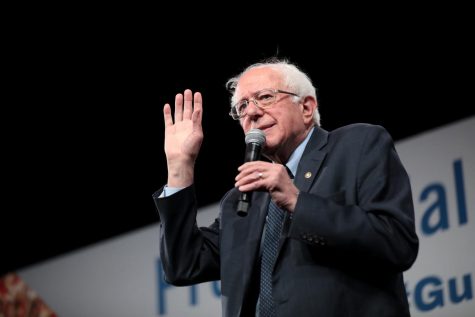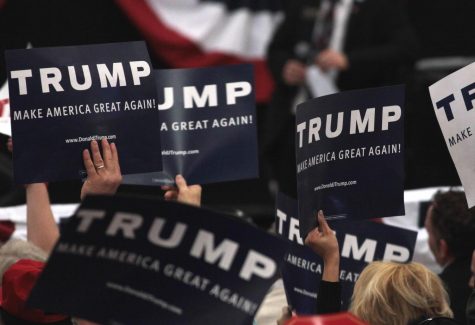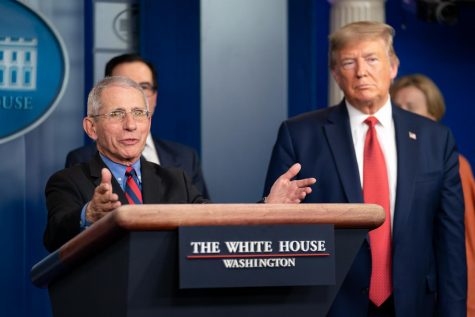The U.S. and North Korea Move Closer to an Uneasy Compromise
President Trump should use his time with Chairman Jong-Un wisely if he wants to pursue this process of denuclearization. (Courtesy of Twitter)
February 20, 2019
By Nicholas Zaromatidis
In President Trump’s recent State of the Union address, he announced an upcoming second meeting with Chairman Kim Jong-Un of North Korea from Feb. 27 to Feb. 28 in Hanoi, Vietnam. Their first meeting was on June 11, 2018 in Singapore. The purpose of this series of meetings was to reduce tensions between the United States and North Korea.
North Korea is currently buried in economic sanctions issued by the U.S. due to its noncompliance with denuclearization laws, the Non-Proliferation Treaty (NPT) in 1985. In 2003, North Korea withdrew due to pressure from the other signatories of the NPT; all signatories had to have annual inspections by the International Atomic Energy Agency. North Korea did not want to comply with this because it still has nuclear weapons.
According to President Trump, the first meeting was “very, very good,” and he was looking forward to building an “excellent relationship” between the two leaders. As part of the de-escalation, Trump promised to remove U.S. troops from South Korea. Ever since the Korean War, the United States has performed routine joint-operations with South Korea as training exercises against the obvious threat of North Korea at the time.
For the first time in about 40 years, the United States is giving North Korea some breathing room, releasing some pressure and hoping it behaves itself. It’s like leaving a child home alone without a baby-sitter, so that parents don’t have to worry about them destroying the house (or the entire planet, in this case). If relations can improve between the U.S. and North Korea, a healthy economic relation could hopefully ensure the integration of North Korea into other global partnerships like the Association of Southeast Asian Nations, the United Nations and possibly the C40, a sustainability committee.
Many criticize the possibility of a trustworthy relationship between the United States and North Korea. I vote to give it a trial run for now. With the United States assuming its current role as a power house, other nations could follow its lead, granting some rights and permissions to North Korea.
Hopefully, North Korea will start to realize that other nations are attempting to better their relations with it and gain a level of appreciation for the U.S. However, the hardest sell for North Korea will be the denuclearization act.
North Korea is accompanied by India, Pakistan and possibly Israel in possessing nuclear weapons and refusing to sign the NPT. For years, this was considered an obvious act of aggression in attempting to stockpile nuclear weapons for potential attacks; however, a nuclear weapon is the only defense against another nuclear weapon. The United States is currently asking North Korea to completely denuclearize while the U.S. still has over 320 times the nuclear weapon stockpile than North Korea. Essentially, the United States is policing North Korea, and Chairman Kim Jong-Un has already noticed it. The Chairman will only completely denuclearize if the United States denuclearized as well, which will never happen.
While there are endless possibilities for what can occur in the future for our two nations, there are three ultimate options: progression, stagnation and retrogression. Retrogression would be the worst of the three: being that North Korea returns to despising the U.S. and starts “test firing” nuclear weapons toward our nation. This could easily result in a nuclear war. If not, hostility will consistently be breed until future relationships between our nations cannot be resolved. Stagnation is not ideal but would not be the worst option. Being open to discussing possible alternatives to compromise is key; however, if we remain at our current state, the U.S. would still live on. It would not have the opportunity to reap neither potential economic nor political benefits from North Korea, but at least our nations would not be at war.
The most ideal situation would be to make progress. This could be in the form of scheduling a third meeting, initiating the process of denuclearization or relieving North Korea from some of the economic sanctions to demonstrate compliance with our rules and regulations.
Overall, these peace talks are steps in the right direction for our two countries. I feel that North Korea will want something large in return for its complete denuclearization other than American denuclearization – which will never occur.
However, I hope that President Trump will use his time with Chairman Jong-Un wisely, as denuclearization is important but can be a long, drawn-out process. There are other pressing issues, such as economic sanctions, stationing of soldiers and North Korea’s current relations with other countries in Southeastern Asia that should be discussed in the interim. A realistic compromise would be one in which both parties walk away from the table not fully satisfied. This might be a difficult concept for the current United States government to understand fully.
Nicholas Zaromatidis, GSB ’21, is an applied accounting and finance major from Franklin Square, New York.












If you want a picture to show with your comment, go get a gravatar.